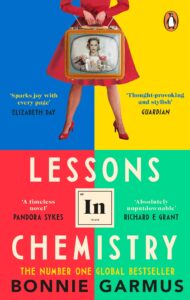 “Lessons in Chemistry” is a heartwarming and inspiring story about a young woman’s journey to becoming a chemist during the 1960s. The novel is set in a time when women were often relegated to traditional roles and men dominated the sciences, making the protagonist’s journey all the more compelling.
“Lessons in Chemistry” is a heartwarming and inspiring story about a young woman’s journey to becoming a chemist during the 1960s. The novel is set in a time when women were often relegated to traditional roles and men dominated the sciences, making the protagonist’s journey all the more compelling.
The story follows Elizabeth Zott, a graduate student studying chemistry, as she navigates through the challenges and obstacles that come with being a woman in a male-dominated field. Elizabeth is intelligent, dedicated, and passionate about science, but she faces discrimination and sexism at every turn.
Despite these obstacles, Elizabeth refuses to give up her dreams. She takes a job as an assistant at a research station. Elizabeth’s passion for science is contagious, and she inspires her female associates/friends to pursue their own dreams, regardless of the obstacles they may face in the work. She meets a senior chemist – who is rather a one-off character – and falls in love. He has an interesting childhood which has a big influence on his character. Unfortunately, he dies early in the novel but has a profound effect on the denouement. Elizabeth is pregnant and this leads to her losing her job. Eventually, she lands a new job as a presenter on a tv cooking show. She makes many demands and Lessons in Chemistry are an essential part of the TV show. Her fame grows but she really wants to be a chemist not a cook.
The novel is not only about Elizabeth’s personal journey but also about the larger societal issues that women faced during this time period. Garmus does an excellent job of exploring these issues in a nuanced and thoughtful way. She shows how women were often overlooked and undervalued in the workplace, and how they had to fight for every opportunity.
One of the strengths of the novel is its characters. Elizabeth is a complex and relatable protagonist, and her struggles and triumphs feel authentic and grounded. Her interactions with her colleagues and students are well-written and engaging, and the supporting cast of characters is equally well-developed. including a dog who has ever increasing vocabulary of words!
Another strength of the novel is its exploration of chemistry as a discipline. Garmus clearly has a deep knowledge and love of chemistry, and she incorporates scientific concepts and theories into the story in a way that is both informative and accessible. The novel is an excellent example of how science can be integrated into fiction in a way that is engaging and educational.
The writing in “Lessons in Chemistry” is excellent. Garmus has a clear and engaging prose style that keeps the reader invested in the story. The pacing of the novel is also well-done, with a good balance of action and introspection.
Overall, “Lessons in Chemistry” is a beautifully written and inspiring novel about a woman’s journey to becoming a chemist in the 1960s. The novel explores important themes about gender and the sciences, and it does so in a way that is both nuanced and accessible. The characters are well-developed and relatable, and the writing is excellent. I highly recommend this novel to anyone who enjoys stories about personal growth, scientific discovery, and the power of perseverance.
Bonnie Garmus Bio
Bonnie Garmus is a writer and scientist based in the San Francisco Bay Area. She received her Ph.D. in Chemistry from the University of California, Berkeley, and has worked as a chemist in both industry and academia.
Garmus has always had a passion for writing, and she has written numerous articles on science and technology for publications such as WIRED, Forbes, and The Huffington Post. In addition to her nonfiction work, Garmus has also published short stories and flash fiction in literary journals such as The Gettysburg Review and The Pinch.





